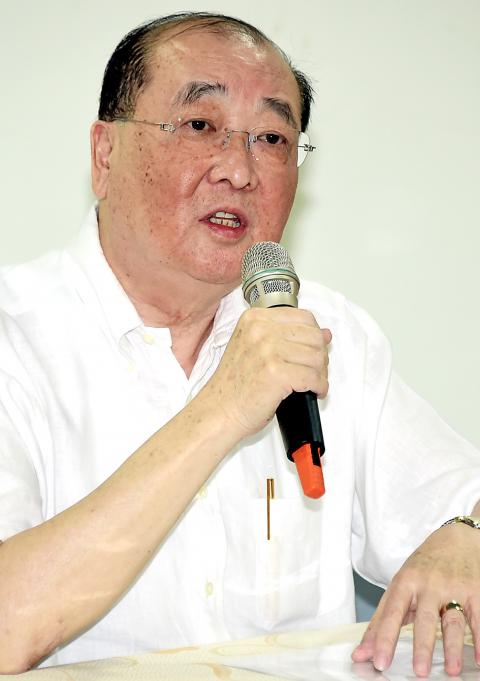Minister of Culture Hung Meng-chi (洪孟啟) yesterday tendered his resignation, despite dismissing a report alleging the ministry offered Chinese Nationalist Party (KMT) lawmakers special allowances in order to have its proposed budget passed without issue.
Next Magazine yesterday reported the ministry, having part of its budget frozen last year, proposed in May to apportion NT$2.5 million (US$75,465) to each KMT lawmaker to ensure the passage of the ministry’s budget this year.
The report alleged, showing what it said to be copies of ministry documents, that top ministry officials made a resolution that lawmakers could apply for the subsidy as long as they are KMT legislators, and that KMT lawmakers sitting on the legislature’s Education and Culture Committee were to be funded first.

Photo: Pan Shao-tang, Taipei Times
Hung denied the allegation, saying that, while the proposal was tabled in an internal meeting, in which only he, the chief secretary and three deputy ministers were present, it was immediately rejected based on a principle of administrative neutrality.
“I am sorry for the trouble it has caused the Executive Yuan and KMT lawmakers, who have not been offered anything and have not submitted any [applications for allowances],” Hung said, adding that he has tendered his resignation to Premier Mao Chi-kuo (毛治國) as the incident has tainted the ministry’s image.
Executive Yuan spokesperson Sun Lih-chyun (孫立群) said Mao had called Hung to ask him to remain in his post and returned Hung’s letter of resignation before a news conference held by Hung at 3pm yesterday.
Six of the seven KMT lawmakers of the legislature’s Education and Culture Committee denied that they had received any special subsidy from the ministry, with only Chiang Nai-shin (蔣乃辛) failing to respond to the magazine’s call, the report said.
Chiang said he has not heard of the proposal or seen the document.
KMT Legislator Chen Shu-hui (陳淑慧) also dismissed the allegations, denying that there is any special subsidy for the governing party’s lawmakers.
“I have called the ministry and they refuted [the accusation]. There was no meeting on it, so there was no official document [on the subsidy] either,” he said.
KMT Legislator Kung Wen-chi (孔文吉) said: “[The allegation] is ridiculous as the ministry is probably the least capable of cooperating with and [attending to lawmakers’ needs].”
Next Magazine later yesterday accused Hung of lying when he said the proposal was rejected without ever being implemented, alleging that, according to the magazine’s source, KMT lawmakers from central and southern regions of the nation have already received subsidies amounting to at least NT$1 million.
The magazine reported that the ministry’s top echelons have, on many occasions, invited related officials to discuss the allocation and follow up on the process after a resolution was made.

CHAOS: Iranians took to the streets playing celebratory music after reports of Khamenei’s death on Saturday, while mourners also gathered in Tehran yesterday Iranian Supreme Leader Ayatollah Ali Khamenei was killed in a major attack on Iran launched by Israel and the US, throwing the future of the Islamic republic into doubt and raising the risk of regional instability. Iranian state television and the state-run IRNA news agency announced the 86-year-old’s death early yesterday. US President Donald Trump said it gave Iranians their “greatest chance” to “take back” their country. The announcements came after a joint US and Israeli aerial bombardment that targeted Iranian military and governmental sites. Trump said the “heavy and pinpoint bombing” would continue through the week or as long

TRUST: The KMT said it respected the US’ timing and considerations, and hoped it would continue to honor its commitments to helping Taiwan bolster its defenses and deterrence US President Donald Trump is delaying a multibillion-dollar arms sale to Taiwan to ensure his visit to Beijing is successful, a New York Times report said. The weapons sales package has stalled in the US Department of State, the report said, citing US officials it did not identify. The White House has told agencies not to push forward ahead of Trump’s meeting with Chinese President Xi Jinping (習近平), it said. The two last month held a phone call to discuss trade and geopolitical flashpoints ahead of the summit. Xi raised the Taiwan issue and urged the US to handle arms sales to

State-run CPC Corp, Taiwan (CPC, 台灣中油) yesterday said that it had confirmed on Saturday night with its liquefied natural gas (LNG) and crude oil suppliers that shipments are proceeding as scheduled and that domestic supplies remain unaffected. The CPC yesterday announced the gasoline and diesel prices will rise by NT$0.2 and NT$0.4 per liter, respectively, starting Monday, citing Middle East tensions and blizzards in the eastern United States. CPC also iterated it has been reducing the proportion of crude oil imports from the Middle East and diversifying its supply sources in the past few years in response to geopolitical risks, expanding

Pro-democracy media tycoon Jimmy Lai’s (黎智英) fraud conviction and prison sentence were yesterday overturned by a Hong Kong court, in a surprise legal decision that comes soon after Lai was jailed for 20 years on a separate national security charge. Judges Jeremy Poon (潘兆初), Anthea Pang (彭寶琴) and Derek Pang (彭偉昌) said in the judgement that they allowed the appeal from Lai, and another defendant in the case, to proceed, as a lower court judge had “erred.” “The Court of Appeal gave them leave to appeal against their conviction, allowed their appeals, quashed the convictions and set aside the sentences,” the judges